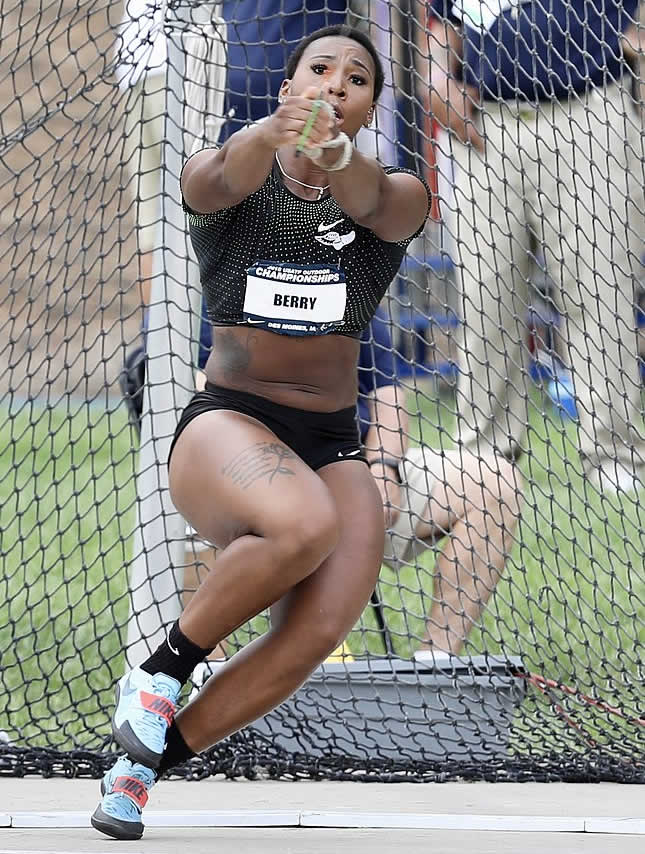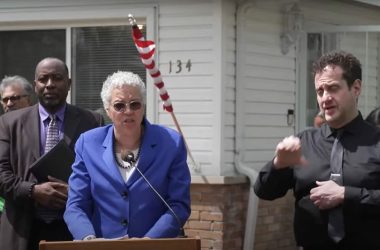
Washington, D.C.-(ENEWSPF)- The co-chairs of the Congressional Caucus on Black Women and Girls, Congresswomen Bonnie Watson Coleman (NJ-12), Yvette D. Clarke (NY-09), and Robin Kelly (IL-02) sent a letter to the President of the International Olympic Committee (IOC) in response to the high level of scrutiny and penalization that has disproportionately impacted Black women during the 2021 Summer Olympic Games trials. In the letter, the co-chairs request the IOC to re-evaluate its current policies and standards in consideration of diversity of cultures, races, ethnicity, and socio-economic backgrounds; with particular consideration of the disparate impact the current policies have on women of the African diaspora.
“In consideration of your stated mission “to act against any form of discrimination affecting the Olympic Movement;” and “to encourage and support initiatives blending sport with culture and education;” we ask the International Olympic Committee to address the lack of racially-based inclusiveness that has been demonstrated by these two international federations,” the co-chairs wrote. “As the mission statement specifically calls out the support of “the promotion of women in sport at all levels and in all structures with a view to implementing the principle of equality of men and women,” it should also seek to do so based on cultural, racial, and socio-economic backgrounds.”
“Black women athletes consistently blaze trails at the Olympics, breaking world records and pushing the standards for performance ever higher. However, Black women have also been subject to high levels of scrutiny, low levels of support, and disproportionate levels of punitive action against them, most recently witnessed during the 2021 Olympic trials,” said Congresswoman Watson Coleman. “The International Olympic Committee must ensure that the standards and requirements that they set forth as a part of their mission statement are inclusive and support the diversity that is so integral to the Olympic spirit. Black women and girls continue to face unique challenges and barriers as they move through society, and the Congressional Caucus on Black Women and Girls is committed to ensuring that their stories and struggles are heard and addressed. It’s time for change.”
“The Olympic Games are a coveted opportunity for athletes of various backgrounds and ethnicities to demonstrate more than their talents; it is a platform to display culture and community on a worldwide stage. Regretfully, the International Olympic Committee’s recent biased, exclusionary actions continue to disproportionately impede Black women from reaching their deserved success. Moreover, it violates the spirit of the Olympics,” said Congresswoman Clarke. “Our unyielding focus as co-chairs of the Congressional Caucus on Black Women and Girls remains with supporting Black women, anywhere and everywhere, full stop. We call upon the IOC to immediately address and reevaluate these harmful and divisive policies.”
“Black women account for some of the most successful and talented Olympic athletes in history,” said Congresswoman Kelly. “The disproportionate level of unfair scrutiny that has been placed on these women throughout the 2021 Olympic trials is completely unacceptable. Black women deserve to be treated with the same respect as other Olympians. We urge the International Olympic Committee to re-evaluate its policies and create a more inclusive and fairer Olympic environment for all athletes.”
Full Text of the House Letter on Treatment of Black Women by IOC
Thomas Bach
President
The International Olympic Committee (IOC)
Maison Olympique
1007 Lausanne
Switzerland
Dear Thomas Bach,
We write to you to express our concern regarding the level of scrutiny and penalization that is disproportionately impacting Black women in their journeys to the 2021 Summer Olympic Games.
Recently, there have been two specific incidents that have been in direct violation of the International Olympic Committee’s mission statement. First, the governing body for aquatic sports, the International Swimming Federation (FINA), refused to approve the use of a swimming cap (“Soul Cap”) designed to accommodate natural Black hair during international competitions. Second, the World Athletics ruled two Namibian sprinters as ineligible to compete due to naturally occurring testosterone levels. These acts are in addition to the general harassment and abuse that Black women have withstood to achieve such incredible feats of athleticism.
Women of the African diaspora have notably been the overwhelming recipients of bias and discriminatory policies that have challenged the very definition of what is deemed “natural,” and therefore, the standard of acceptance in restricted competition. Black women should not be made to feel unnatural because of their naturally occurring biology. Policies that attack, ignore, or fail to accommodate Black women in their natural form is not only disturbing, but is in direct contradiction to the spirit of the Olympic games and specifically, line thirteen of the International Olympic Committee’s mission statement of encouraging and supporting “the development of the sport for all.”
Black women have also been criticized and ridiculed for their activism for social justice. A U.S. Olympic hammer-thrower, a Black woman, was heavily criticized for peacefully protesting during the playing of the national anthem during the medal ceremony for the U.S. track and field Olympic trials.
We are aware that the International Olympic Committee intends to enforce a policy known as Rule 50, which would prevent athletes from protesting or demonstrating at the Tokyo Olympics. In a statement from the IOC, it was stated that “the Rule strives to ensure that the focus at the Olympic Games remains on the athletes.” Of course, the athletes are not singularly comprised of their athletic prowess: they are more than their physical abilities. They are whole people, with unique human experiences and realities. They are likewise in need of unique holistic considerations when it comes to standards for decision-making and policy practices.
In consideration of your stated mission “to act against any form of discrimination affecting the Olympic Movement;” and “to encourage and support initiatives blending sport with culture and education;” we ask The International Olympic Committee to address the lack of racially-based inclusiveness that has been demonstrated by these two international federations. As the mission statement specifically calls out the support of “the promotion of women in sport at all levels and in all structures with a view to implementing the principle of equality of men and women,” it should also seek to do so based on cultural, racial, and socio-economic backgrounds.
It is well understood that greater diversity in leadership roles leads to better decision-making, particularly in the pursuit of goals aligned with the IOC’s mission statement and in representing the wide diversity of Olympic athletes. However, while FINA has 30 Bureau and Executive members, only five are women and none of these women are Black. Similarly, World Athletics boasts a board that consists of eight people. Though they have a wider, more diverse council, the council only makes requirements based on gender only, not race or ethnicity. Commitment to full inclusion and diversity starts from the leadership at the top beginning with the boards and executives that govern these organizations.
We believe it is the IOC’s duty to take action to underscore its commitment to anti-discrimination, anti-racism, and diversity for all athletes, future athletes, and spectators from all backgrounds. We respectfully request the IOC to re-evaluate its current policies in consideration of diversity of cultures, races, and ethnicity; with particular consideration of the disparate impact the current policies have on women of the African diaspora. Additionally, we ask that you report on the findings of your re-evaluation and any policy changes made. We look forward to further engagement with you and receiving a timely response.








